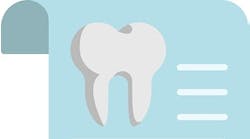As a wave of consolidation sweeps across the industry, dental entrepreneurs are increasingly gravitating toward dental service organization (DSO) partnerships, motivated primarily by the work-life balance advantages and the financial opportunities. The focus on finances is understandable because, with the right DSO partner, the monetary benefits can be substantial for practice owners, both up front and in the future.
But there’s another reason to consider a DSO partnership that doesn’t get as much attention: DSOs can help dentists mitigate the significant risks that threaten their most valuable asset—their practice. If you’ve ever considered a DSO partnership or are open to that option in the future, it makes sense to consider not only the financial advantage, but the risk mitigation opportunities as well. Here’s a closer look at how working with a DSO can derisk your life’s work while improving practice prosperity.
How DSOs mitigate risks for busy practices
Busy dental entrepreneurs typically handle multiple practice management roles in addition to providing patient care. Like other professionals, most carry life insurance to ensure their family is provided for in the event of illness or death. But many may not fully appreciate how much the value of their practice depends on their continued good health and what their family stands to lose if something unexpected happens.
You may also be interested in ... What changes and what stays the same when you join a DSO
In one real-world example, a practice owner I worked with received a substantial offer from a DSO, but decided to hold out and continue operating as a solo practitioner as we continued to explore other offers. Shortly after that, he suddenly came into very poor health and passed away. Losing a loved one is most certainly an extremely heavy burden for many families, and this was only exacerbated as this doctor’s family also had to take on the burden of what to do with their loved one’s dental practice through their grieving. The practice lost 5% of value per week as his family attempted to sell the business and was eventually sold for a mere 40% of the original DSO offer.
This unfortunate true story is a dramatic example of a real risk practice owners face, but there are many other scenarios where working with a DSO can alleviate risk while making life easier for time-challenged dental entrepreneurs who are wearing multiple hats as they operate their business. For example, in the event of an illness or injury to a dentist, DSOs can tap into their extensive network of practitioners to fill the gaps so patient care continues without a hitch.
Clinically agnostic DSOs also have an overarching management structure that can cover the other aspects of practice operations—back-up resources that a solo dental entrepreneur cannot easily access, including help with recruiting, hiring, marketing, and business administration. It’s important for practice owners who are considering a DSO partnership to factor in all these benefits.
How DSOs reduce risk via diversification while providing unique investment opportunities
Investment diversification is another factor to keep in mind. Your practice is your greatest asset, but if a thriving practice is your only investment vehicle, you’re like an investor whose entire portfolio is Apple stock. Apple is a great company, but investors generally opt for a diversified portfolio to mitigate the risk of putting all their eggs in a single basket. DSOs provide an investment vehicle that allows you to monetize your life’s work, clear debts, and get paid up front while diversifying your portfolio.
DSOs have filled a vacuum in an environment where it has become increasingly difficult to sell a large practice to an individual because, in addition to mitigating risks, DSOs offer dental entrepreneurs an alternative market and a type of investment opportunity formerly available only to the ultrawealthy in the form of holding company stock.
In the dental industry, holding company stock has historically compounded at a rate that far outperforms the stock market or any other traditional investment vehicle. This is based on PTS metrics from over 550 transitions completed and hundreds of recapitalization events. This equates to an average ROIC (return on invested capital) of approximately 3x every three years or 5x every five years.
Last year, we saw the average age of dentists selling their practice outright or to a DSO significantly decrease. The average age of our “transactee” last year was mid-40s. These younger dentists are planning their legacies and securing their financial futures rather than planning retirement, and beginning practice transition plans at least five years out is the key to maximizing wealth accumulation, and a nice cherry on top is that work-life balance often improves.
How to find a partnership that works for you
There are over 350 DSOs and over 1,500 private equity groups currently investing in private dental practices. All have wide variations in business strategy and operating practices. You’ll want to thoroughly understand the pros and cons before making a deal and make sure you find a partnership that works for you.
For many, the right partner is a clinically agnostic group that enables you to retain staff and operate under your established standards. And, the upside can be tremendous. Advantages can include better benefits and career opportunities in an expanded organization for the star members of your staff, professional HR and marketing support, lower supply and equipment costs via economies of scale, lower capital risk, and a better work-life balance for you. It really can be a have-your-cake-and-eat-it-too situation.
Keep in mind that contract terms are also critical. Deal structures vary widely, and for dental entrepreneurs, contracts can include performance incentives and guaranteed income, just as they do when professional athletes negotiate contracts with teams. It’s important to find a deal structure that meets your objectives and risk tolerance.
The consolidation wave in the dental industry will break eventually—it is expected to crest at 65% to 70% in the next five to seven years as private equity funding pours into the sector,1 so there is a finite time horizon to take advantage of this consolidation cycle. The financial opportunities are compelling, but keep the risk mitigation benefits in mind too so you can make the most informed decision about your most valuable asset.
Editor's note: This article appeared in the February 2024 print edition of Dental Economics magazine. Dentists in North America are eligible for a complimentary subscription. Sign up here.
Reference
- Booth J. Selling up for millions: Equity arbitrage increasing weath of US dentists, but not for long. Dental Tribune. June 9, 2002. https://www.dental-tribune.com/news/selling-up-for-millions-equity-arbitrage-increasing-the-wealth-of-us-dentists-but-not-for-long/
Ty Ramsey is a practice transition advisor at Professional Transition Strategies (PTS), with nearly two decades of dental industry excellence. A proud graduate of the Red McCombs School of Business at the University of Texas at Austin, he navigated the tumultuous “dotcom” crash of the early 2000s before embracing the dental realm. Since 2008, Ty has generated over $80M in dental technology revenue, all the while helping practices nationwide to grow as well as helping practitioners enhance diagnosis and treatment.






